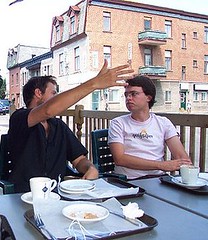Conditioning
It’s easy to forget how great the Soviet Union was:
A Negro, in the opinion of Herbert Spencer, an English philosopher and sociologist of the 19th century, is by his nature incapable of abstract thinking. [Footnote: This viewpoint, which justified inequality and and social oppression, has long since been refuted by life: young people from many Asian, African, and Latin American countries studying the the Soviet Union are making good progress in all subjects, philosophy included.]
This is from What is Philosophy? by Galina Kirilenko and Lydia Korshunova, a book published by the USSR’s foreign propoganda arm, Progress Publishers, in 1985. Marred as it is by Stalinist third-periodism and a rather simple-minded cod-Hegelian dialectical materialism, it’s still an incredibly good introduction to philosophy. I like its relative anti-Eurocentrism (we don’t start with the pre-Socratics, but with a survey of the “almost simultaneous emergence of the first philosophical doctrines in ancient India, China and Greece,” not forgetting the Aztecs). Even more, though, I like its situating of philosophy as an activity:
What is philosophy? It is a world outlook, it is a view of the world—of nature and society. and of man’s place in it—and an analysis of the possibilities of understanding and transforming it. But it is also a conviction, a belief in the necessity for action on the base of this acquired knowledge. It is a blend of knowledge and assesment, knowledge and conviction, the emotional and the rational. So, philosophy is a special form of theoretical knowledge, involving not just an objective generalisation of of the entire human experience, but also the identification of moments in that experience which are of particular significance for man.
The Marxist definition of philosophy as a form of theoretical knowledge resolving the most general issues relating to world outlook, is essentially different from all former ideas about the tasks of philosophy, as well as from its modern bourgeois interpretations.
 In the picture, you can see me having Husserl’s concept of philosophy explained to me by Ken Knies, who had delivered a very interesting paper on the topic
In the picture, you can see me having Husserl’s concept of philosophy explained to me by Ken Knies, who had delivered a very interesting paper on the topic![Download PDF file [PDF]](/res/PDF.png) the previous day. It took me a while to grasp it, and I realized that was partly because it goes against a group of presuppositions so deeply ingrained I hadn’t fully realized I held them. The idea of philosophy as purely self-contained, as subordinate only to itself, is almost incomprehensible to me. This is why I’m so impressed with Badiou’s insistence that philosophy is never freestanding, that it is always conditioned. Badiou rightly rejects the historicist view that the product of any philosophy can only be of value to its time; but he emphasizes the fact that there is no task of philosophy, instead the tasks of philosophy are always intimately tied to developments outside of philosophy (he says, events in art, science, politics, and love).
the previous day. It took me a while to grasp it, and I realized that was partly because it goes against a group of presuppositions so deeply ingrained I hadn’t fully realized I held them. The idea of philosophy as purely self-contained, as subordinate only to itself, is almost incomprehensible to me. This is why I’m so impressed with Badiou’s insistence that philosophy is never freestanding, that it is always conditioned. Badiou rightly rejects the historicist view that the product of any philosophy can only be of value to its time; but he emphasizes the fact that there is no task of philosophy, instead the tasks of philosophy are always intimately tied to developments outside of philosophy (he says, events in art, science, politics, and love).
This has always been how I have undertaken philosophy: one of the life changing books I’ve forgotten is Bryan Macgee’s Men of Ideas, a set of irritating and often wildly misleading interviews with leading philosophers of the ’70s, and the first philosophy book I ever read. My dad pointed me towards it after overhearing one too many irritatingly ungrounded adolescent discussions of politics between me and my friends, and somewhere that initial impetus remains. Philosophy only makes sense to me when animated by some need external to philosophy, a context which whatever philosophy I’m studing can inhabit. This approach is particularly significant in my response to the moralizing that today so often passes as political thinking. To some, dismissal of a discussion on some issue with the question “but how can we act?” is seen as the height of immorality. To communists, the opposite must be the case: a consideration of philosophy in terms of the particular problems we face is a precondition of acting, and so necessarily a precondition of acting morally. Or, in the words of Galina Kirilenko and Lydia Korshunova:
Even the issue of the preconditions of philosophy, seemingly far removed from the current problems, involves ideological struggle.
No comments
No comments yet.
Leave a comment
Sorry, the comment form is closed at this time.